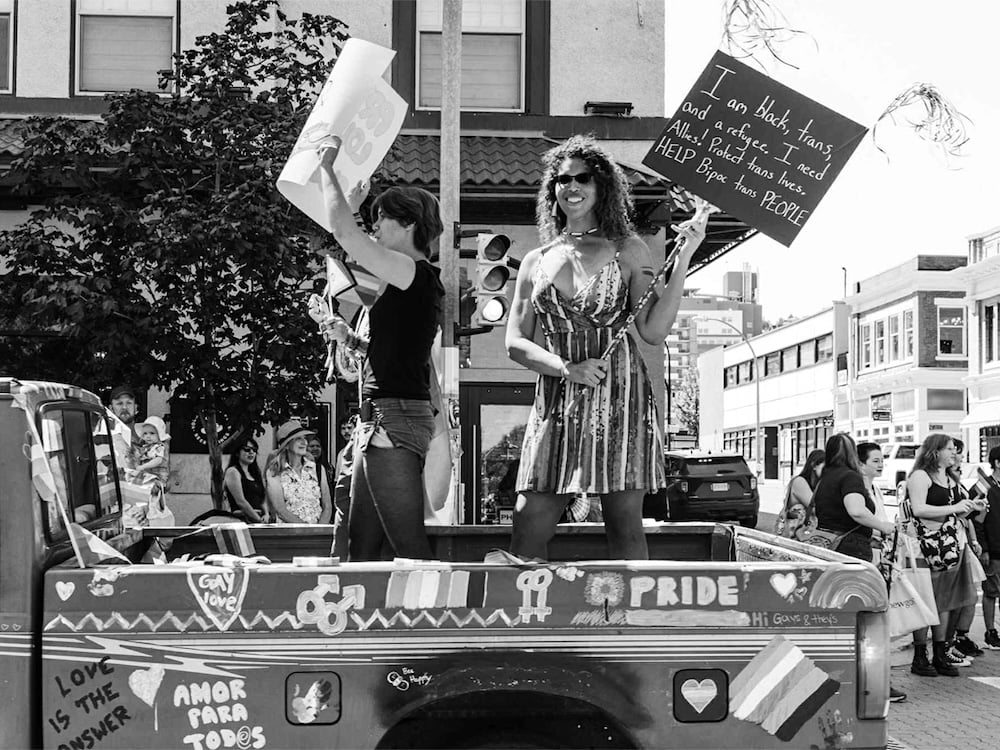Lifestyle
Black and Trans Americans Seek Asylum in Canada Amid Rising Violence

The increasing violence against Black and transgender individuals in the United States has prompted many to seek refuge in Canada. This surge in asylum applications is exemplified by the story of Zara Sluys X, a biracial Black woman who decided to leave the U.S. after hearing conservative commentator Michael Knowles call for the “eradication of transgenderism” during the 2023 Conservative Political Action Conference. Sluys X, who has faced severe anti-Black racism throughout her life, is now preparing her application for asylum in Canada, citing the unsafe conditions for marginalized communities in her home country.
Sluys X’s traumatic experiences began in childhood, including an incident where a white babysitter shot her in the head with a BB gun. “The doctors say if he had been a step closer, the BB pellet would have penetrated my skull and killed me,” she recounted in an interview with The Tyee. After moving to British Columbia in January, she faced personal challenges, including a deteriorating relationship with her partner, which led her to seek transitional housing for domestic violence victims.
The urgency for asylum is underscored by grim statistics. In 2022, at least 32 transgender and gender non-conforming individuals were murdered in the U.S., with a significant portion of these victims being Black trans women. A study from the University of California, Los Angeles, revealed that transgender individuals are four times more likely to experience violent victimization compared to their cisgender counterparts.
In response to the escalating violence and discrimination, Cait Glasson, an advocate based in Ontario, initiated an online parliamentary petition in 2023. This petition calls for the Canadian government to extend asylum rights to transgender and non-binary individuals facing exclusionary legislation in their home countries, particularly in the United States and the United Kingdom. The petition has garnered over 160,400 signatures, highlighting the widespread concern regarding the treatment of trans individuals.
Despite the growing number of asylum seekers, Immigration, Refugees and Citizenship Canada has not provided specific statistics on asylum seekers based on gender or sexual orientation. A spokesperson for the office stated, “We cannot speculate on future policy decisions nor comment on internal U.S. government measures.” Sluys X believes she may be the first Black trans American to seek asylum in Canada, although she is not the first trans person from the U.S. to apply. According to Reuters, there were 245 asylum claims from Americans in the first half of 2025, the highest number since 2019, which included at least two trans individuals.
Recent legal cases have underscored the challenges faced by LGBTQ+ asylum seekers. A Canadian Federal Court judge recently ordered a stay of deportation for Angel Jenkel, a non-binary American, citing a lack of consideration for current conditions affecting LGBTQ+ individuals in the U.S.
The landscape for Black and trans people in the U.S. has been particularly troubling. Victoria E. Thomas, an assistant professor at Simon Fraser University, emphasized that it has never been safe to be Black, let alone Black and trans, in America. She pointed to recent legislative actions that have negatively impacted marginalized communities, including the introduction of 987 anti-trans bills across 49 states since January 2023, with 122 having already passed. These measures include bans on trans participation in sports and the elimination of gender-affirming medical care for minors.
Despite the challenges in Canada, including instances of police brutality and systemic racism, Thomas notes that Canadian laws against hate speech and stricter gun control differentiate it from the U.S. “Freedom of speech in America covers hate speech,” she explained, adding that this creates an environment where marginalized individuals face grave risks.
Legal experts highlight the difficulties asylum seekers must navigate. A. Connie Campbell, a Vancouver-based lawyer specializing in LGBTQ2S+ immigration, noted that only one successful Canadian asylum claim by a trans American is recorded. Applicants must provide evidence of persecution, which complicates claims significantly. Campbell expressed concern that Canadians may not support mass asylum programs for trans individuals, as seen with previous refugee crises.
Sluys X reflects on Canada’s historical context of accepting Black asylum seekers. She questions whether current political and social attitudes will allow for a similar response today. “Will it always have to be behind closed doors?” she asks, emphasizing the urgent need for recognition and support for those seeking refuge.
As the landscape for marginalized communities in the U.S. continues to deteriorate, the call for Canada to extend its arms to those fleeing persecution remains critical.
-

 World4 months ago
World4 months agoScientists Unearth Ancient Antarctic Ice to Unlock Climate Secrets
-

 Entertainment4 months ago
Entertainment4 months agoTrump and McCormick to Announce $70 Billion Energy Investments
-

 Lifestyle4 months ago
Lifestyle4 months agoTransLink Launches Food Truck Program to Boost Revenue in Vancouver
-

 Science4 months ago
Science4 months agoFour Astronauts Return to Earth After International Space Station Mission
-

 Technology2 months ago
Technology2 months agoApple Notes Enhances Functionality with Markdown Support in macOS 26
-

 Top Stories3 weeks ago
Top Stories3 weeks agoUrgent Update: Fatal Crash on Highway 99 Claims Life of Pitt Meadows Man
-

 Sports4 months ago
Sports4 months agoSearch Underway for Missing Hunter Amid Hokkaido Bear Emergency
-

 Politics3 months ago
Politics3 months agoUkrainian Tennis Star Elina Svitolina Faces Death Threats Online
-

 Politics4 months ago
Politics4 months agoCarney Engages First Nations Leaders at Development Law Summit
-

 Technology4 months ago
Technology4 months agoFrosthaven Launches Early Access on July 31, 2025
-

 Top Stories1 week ago
Top Stories1 week agoFamily Remembers Beverley Rowbotham 25 Years After Murder
-

 Entertainment4 months ago
Entertainment4 months agoCalgary Theatre Troupe Revives Magic at Winnipeg Fringe Festival




















